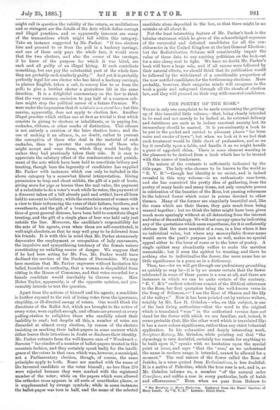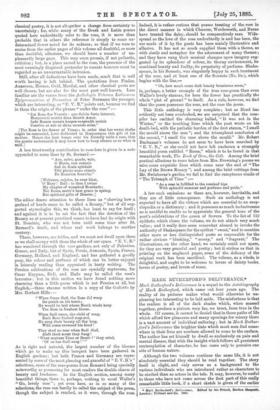THE POETRY OF THE ROSE.* THERE is only one complaint
to be made concerning the getting- up of this beautiful little volume,—that, being clearly intended to be read and not merely to be looked at, its external delicacy and daintiness are such as to induce constant anxiety lest its immaculacy should be marred. It is pre-eminently a book to be put in the pocket and carried to pleasant places "far from noise and smoke of town"; but when we look at it we feel that such treatment would be little short of profanation, and so we lay it carefully upon a table, and handle it as we might handle a piece of egg-shell china. There is some element wanting in the pleasure to be derived from a book which has to be treated with this excess of tenderness.
The nature of the contents is sufficiently indicated by the title-page. The lady who chooses to be known to the world as "E. IT. B."—though her identity is no secret, and is indeed revealed in this very volume—is an enthusiastic rose-lover, and she has conceived the pretty idea of gathering, from the poetry of many lands and many times, not only complete poems in celebration of the beauties of the Rose, but passing references to the beloved flower which occur in poems devoted to other themes. Many of the former are singularly beautiful and, like the roses which are their theme, they gain much from being massed together ; but we think the latter might have been given much more sparingly without at all detracting from the interest and value of the anthology. We will not occupy space by indicating any of the quotations which seem superfluous, for it is sufficiently obvious that the mere mention of a rose, in a line where it has no individual value, but where any monosyllabic flower-name would serve the poet's purpose just as well, makes no special appeal either to the lover of roses or to the lover of poetry. A single epithet may abundantly suffice to make the mention memorable ; but if even the epithet be wanting, and there be nothing else to individualise the flower, the mere name has as little significance in a poem as in a dictionary.
Then, too—for we will get through our preliminary grumbling as quickly as may be—it is by no means certain that the flower celebrated in some of these poems is a rose at all, and there are instances in which we can be quite certain of the contrary. "E. IT. B.'s " earliest selections consist of the Biblical references to the Rose, her first quotation being the well-known verse in the Song of Solomon,—" I am the Rose of Sharon and the lily of the valleys." Now it has been pointed out by various writers, notably by Mr. Leo H. Grindon—who, on this subject, is one of the best living authorities—that the word in the original which is translated " rose " in the authorised version does not stand for the flower with which we are familiar, and, indeed, it seems probable that, like the other word which is translated lily, it has a mere colour-significance, rather than any strict botanical application. In his exhaustive and deeply interesting work, Scripture Botany, Mr. Grindon, while pointing out that "the etymology is very doubtful, certainly too unsafe for anything to be built upon it," speaks with no hesitation upon the special point at issue, and says "that the rose,' as we understand the name in modern usage, is intended, cannot be allowed for a moment." The real nature of the flower called the Rose of Jericho, in a verse quoted from Bcclesiasticus, is less doubtful. It is a native of Palestine, which the true rose is not, and is, as Mr. Grindon informs us, a member "of the natural order Cruciferce, and unlike a rose in every particular, both of habit and efflorescence." Even when we pass from Hebrew to
* Bee Besarom ex Horto Peetarum. Gathered from the Poets' Garden3 of Many Lands. By "E. V. B." London: Elliot Stock. classical poetry, it is not altogether a change from certainty to uncertainty ; for, while many of the Greek and Latin poems quoted here undoubtedly refer to the rose, it is more than probable that in others the reference is simply to some un-
determined flower noted for its redness ; so that if we were to excise from the earlier pages of this volume all doubtful, or more than doubtful, allusions, we should leave a number of un- pleasantly large gaps. This may seem prosaic, if not pedantic, criticism ; bat, in a place sacred to the rose, the presence of the most cunningly disguised pretender to roseate honours must be regarded as an unwarrantable intrusion.
Still, after all deductions have been made, much that is well worth having is left behind. The quotations from Pindar, Anacreon, Horace, Ovid, Martial, and other classical poets are well chosen, but are also for the most part well known. Less familiar are the verses from the Anthologia Veterum Latinorum Bpigrammatum et Poematum of Peter Burmann the younger, which are interesting, as "E. V. B." points out, because we find in them the origin of the phrase "under the rose" :—
" Est Rosa fibs Veneris : quo dulcia farts laterent,
Harpocrati matris dona dioavit Amor.
Lade Rosam mensis hospes snspendit amicis Conviva nt sub ell dicta tacenda sciat."
[The Rose is the flower of Venus; in order that her sweet thefts might be concealed, Love dedicated to Harpocrates this gift of his mother. Hence the host hangs over his friendly table a rose, that the guests underneath it may know how to keep silence as to what is said.]
A less trustworthy contribution to rose-lore is given in a note appended to some lines by St. Bernard :—
"Are, salve, gande, vale,
0 Maria non vernale
Sod de Maria, spiritale
Tibi plecto mune crinale De Rosaram floscudis."
[Welcome, rejoice, be ever blest, 0 Mary ! : to thee I twine My chaplet of wreathed Rosebuds; Not Roses, earth's best grace in spring, Bat spiritual gifts of Heaven.]
The editor draws attention to these lines as "showing how a garland of beads came to be called a Rosary," but of all sug- gested etymologies this, we think, has least to say for itself ; and against it is to be set the fact that the devotion of the Rosary as at present practised seems to have had its origin with St. Dominic, who was not born until some time after St.
Bernard's death, and whose real work belongs to another century.
These, however, are trifles, and we must not dwell upon them or we shall occupy with them the whole of our space. "E. V. B." has wandered through the rose-gardens. not only of Palestine, Greece, and Italy, but of Syria, Persia, Armenia, Spain, France, Germany, Holland, and England, and has gathered a goodly posy, the colour and perfume of which can be better enjoyed in leisurely reading than appraised in hasty writing. The Persian celebrations of the rose are specially rapturous, for Omar Kayyam, &Ai, and Hafiz may be called the rose's laureates ; but in this section we have found nothing more charming than a little poem which is not Persian at all, but English,—three stanzas written in a copy of the Gv2istcin by Mrs. Herbert Hills :—
"When Omar died, the Rose did weep Its petals on his tomb;
He would be laid where North winds keep The Rose in freshest bloom.
When Sadi came, the child of song, Each Rose flashed rospred, He sang their beauty all day long, With roses crowned his head !
They shed no tear when Sadi died, Aloft their scent they flung !
What matters Time or Death ?' they cried, 'Of us has Sadi sung ! ' "
As is right and natural, the largest number of the blooms which go to make up this bouquet have been gathered in
English gardens; but both France and Germany are repre- sented by some of the most pleasing and graceful of "E. V. B.'s " selections, some of the rose-poems from Ronsard being specially noteworthy as possessing for most readers the double charm of beauty and freshness. In the English section, among many beautiful things, there is, perhaps, nothing to excel Waller's "Go, lovely rose " ; yet even here, as in so many of the
selections, the rose can hardly be called the subject of the poem, though the subject is reached, as it were, through the rose.
Indeed, it is rather curious that poems treating of the rose in the direct manner in which Chaucer, Wordsworth, and Burns have treated the daisy, should be comparatively rare. Wide- spread as the love of the rose undoubtedly is and has been, the use made of it by the poets has been mainly illustrative and allusive. It has not so much supplied them with a theme, as with simile and metaphor for the adornment of many themes ; and they have rung their musical changes upon imagery sug- gested by its splendour of colour, its thorny environment, its combined beauty and frailty, its perpetuity of perfume. Shake- speare, in his Sonnets, was singularly happy in. such treatment of the rose, and at least one of the Sonnets (No. liv.), which begins with the line,—
" Oh, how much more doth beauty beauteous seem,"
is, perhaps, a better example of the true rose-poem than even Waller's lovely stanzas, for here the flower has practically the whole "plot of ground" to itself. As a rule, however, we find that the poem possesses the rose, not the rose the poem.
This little anthology is very complete ; but as Hood has evidently not been overlooked, we are surprised that the com- piler has omitted the charming ballad, "It was not in the Winter," or the touching lines which the poet wrote on his death-bed, with the pathetic burden of the first stanza, "I smell the mould above the rose "; and the triumphant conclusion of the second, "I smell the rose above the mould." Mr. Robert Buchanan's volumes do not seem to have been searched by "E V. B.," or she could not have left unchosen a strangely beautiful poem entitled "Roses," which is to be found in that remarkable work, The Book of 071n, the Celt. Among the brief poetical allusions to roses taken from Mrs. Browning's poems we miss some exquisite lines which come near the end of "The Lay of the Brown Rosary "; and among the brief cuttings from Mr. Swinburne's garden we fail to find the sumptuous simile of "The Triumph of Time" "As a rose is fulfilled to the roseleaf tips
With splendid summer and perfume and pride."
A few such omissions as these are, however, inevitable, and they are of little consequence. Such an anthology is not expected to have all the virtues which axe essential to an ency- clopaedia or a dictionary ; and it possesses as much inclusiveness as is needful to enable us to appreciate the general tone of the poet's celebrations of the queen of flowers. To the list of 112 epithets, which closes the volume, we do not attach very much value; and it really does seem somewhat absurd to invoke the authority of Shakespeare for the epithet "sweet," and to mention other more or less distinguished poets as responsible for the rather obvious "blushing," "mossy," and "fragrant." The illustrations, on the other hand, we certainly could not spare, for they are very graceful and pretty ; but it strikes us that in printing on the unglazed paper, some of the delicacy of the original work has been sacrificed. The volume, as a whole, is delightful, and ought to be welcome to lovers of dainty books, lovers of poetry, and lovers of roses.



































 Previous page
Previous page